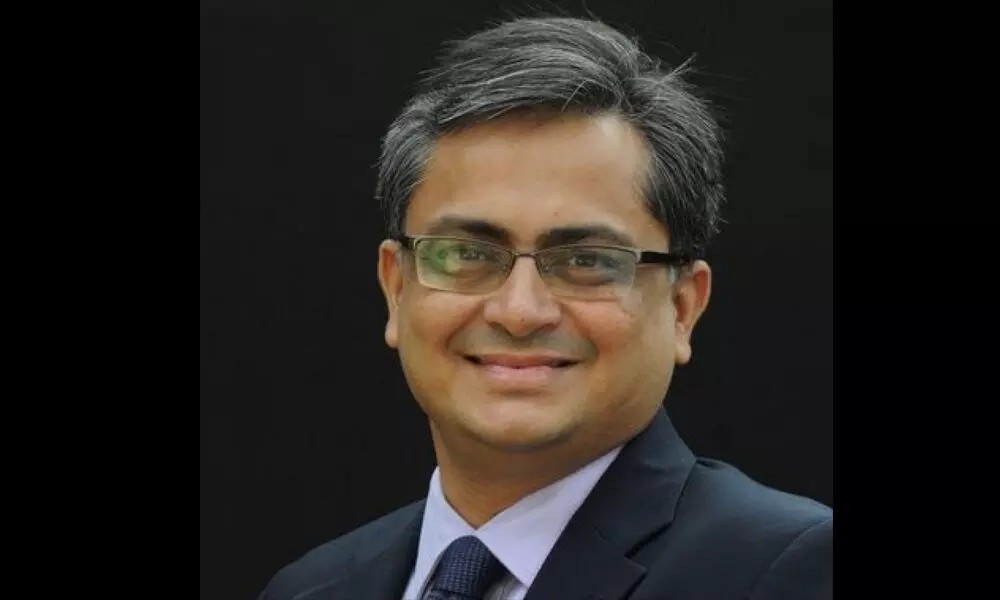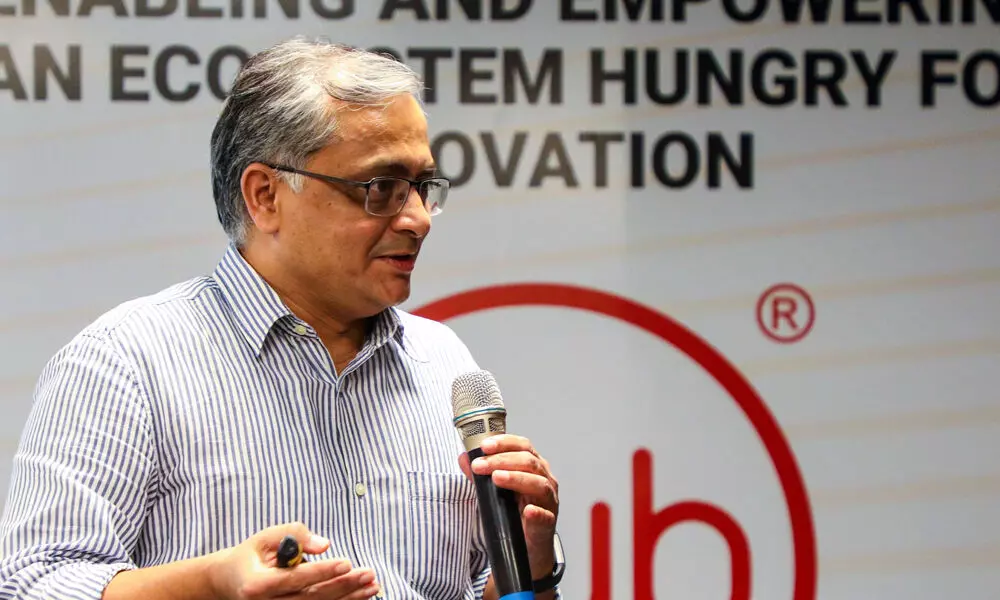T-Hub expanding vistas of startup ecosystem in TS
T-Hub will see a few startups reaching unicorn status in the future, says its CEO Ravi Narayan
image for illustrative purpose
After successfully nurturing more than 1,800 startups over the last five years, India's largest incubator T-Hub is now looking forward to enabling its startups to help solve problems for the global market. Backed by the Telangana government, it continues to evaluate partnerships with the international and national government bodies, research institutes and ecosystem enablers. "T-Hub has forged some strong international connects in the last year, with the South Korean Government, Japan Investment and Cooperation Agency (JICA) and others, which helped create over 390 international startup connects," Ravi Narayan, CEO, T-Hub said in an exclusive interview with Bizz Buzz
How many startups are being incubated at T-Hub at present? How many are waiting for admission?
More than 1,800 startups have been associated with T-Hub in the past five years through its various programmes and initiatives. We provided them incubation support, national and international corporate, investor, and government connects. Telangana State innovation intermediary and business incubator based in Hyderabad has been actively engaging with other ecosystem enablers, thereby supporting startups from across the ecosystem.
Till now, what is the overall funding received by the startups incubated at T-Hub?
Startups associated with T-Hub raised about Rs 1,860 crore investment. T-Hub improves startups' ability to raise capital through its various interventions and workshops. A testament to this is that despite the pandemic, our startups raised a total Rs 100 crore investment in the past 12 months. Are there any startups that are on the way to unicorn status? If not, please specify why Hyderabad-based startups are unable to make it to the coveted club.
Telangana innovation ecosystem is maturing in different sectors like life sciences, agritech, and other healthcare sectors using advanced technologies like Artificial Intelligence and Machine Learning. All the sectors that these startups are thriving in have a larger gestation period. But we will be seeing a few startups reaching unicorn status in the future with the support from all the ecosystem enablers of the State.
T-Hub has proactively reached out to VCs with curated startups and expects mega deals to follow in the coming days. In March this year, T-Hub had two rounds of focussed meetings with a group of select VCs wherein in the first round, healthcare devices startups had made their pitches and in the second round, semiconductor players pitched their business plans. In T-Hub, we believe there is a movement in the right direction, and we will see more Series-C, Series-D investments in the coming days before you see more unicorns popping up out of Hyderabad.
Do you think T-Hub is successful in attracting startups across the country and abroad when compared to Bengaluru?
Most of the ecosystems as they begin to grow, also starts fragmenting into pieces but Hyderabad ecosystem continues to build a close-knit group of entrepreneurs, corporates, investors, academia, and the government that actively networks and collaborates. This helps in the consulted growth for startups in the ecosystem. Hence, startups from various cities like New Delhi, Mumbai, Trivandrum, Bangalore, Patna, Noida have been a part of the T-Hub's various programmes along with startups in rural innovation space with social impact.
T-Hub has also been able to attract foreign startups by being the preferred gateway for these start-ups to access the Indian market. T-Hub has partnered with international ecosystem enablers and governments like Korea SMEs and Start-ups Agency (KOSME), FalconX, Australian Consulate, Japan Investment and Cooperation Agency (JICA) and others to help the foreign startups to scale up in the Indian market. T-Hub is also bringing the culture of entrepreneurship at the student level across the country through its capacity building programme. During such unprecedented times of a global crisis, there is a need to create a strong innovation-driven culture among student innovators and aspiring entrepreneurs in academic institutions.
Why there is a delay in the construction of the second phase building of T-Hub? When it will be functional? What is the current stage of the 3-lakh-sqft building?
Initially, the work was delayed due to various factors, while the Covid-19 pandemic had led to further delay.
How much is being invested by the State government?
The Telangana government along with T-Hub had launched T-Angels in mid-2019 to bridge the fundability gap of city startups and create a robust investment ecosystem in the State. As part of this programme, a group of startups were connected to investors and the second batch is expected to be launched soon, to boost the investment in Hyderabad. T-Hub's corporate memberships and partnerships have enabled more than 350 startups to collaborate, raise money or get acquired by large corporates. Of them, about 100 startups are from Hyderabad which engaged in such programmes.
Another investment by the State Government for the startup is T-Hub phase-2 which is being built at cost of Rs 276 crore which will house more than 1,500 startups.
Can you let us know more about the facilities that will be offered to startups at the new building?
T-Hub is a unique initiative in the country and has been dealing with multiple ecosystems that foster innovation and not just individual startups. There are multiple stakeholders involved including the Telangana government, academia, research, and industry. Representing the same, T-Hub phase-2 will be a microcosm of the Innovation ecosystem. It will not just house startups but will house corporations, investors, and other ecosystem enablers. The second phase will be known as a centre for startup innovation, corporate innovation, and ecosystem innovation. These are key for generating demand. Due to this robust innovation ecosystem that T-Hub has built, we have seen a rise in the number of start-ups from 400 then to about 2,000 now, and phase-2 will further boost this growth.
Is there any development in setting up T-Hub facilities in tier-II cities of Telangana?
Facilities similar to T-Hub will soon be established in tier-2 cities such as Warangal, Karimnagar, and Khammam by the government in the State to foster innovation and entrepreneurship. By decentralising the IT industry, the State government has planned to expand it to tier-II cities.
In 2020, the state government in its Socio-Economic Outlook 2020 had announced that it will concentrate on developing Warangal, Khammam, and Karimnagar into IT hubs. The Telangana State Industrial Infrastructure Corporation (TSIIC) has built an IT Incubation Centre in Warangal on a two-acre land. Meanwhile, in Karimnagar, an IT centre is being constructed in an area of 51,600 sq ft.
How T-Hub is operating amid this pandemic period?
The Covid has led to a change in the way T-Hub programmes are being offered. T-Hub has quickly added a digital channel for mentoring and delivering their programmes, adapted, and pivoted during the pandemic. The digital engagement channel is being used prominently to reach more startups while the focus would be on evolving solutions for global problems. The number of corporates that T-Hub was working with has also increased to 600 from the existing 435 and increase the number of academic partners. T-Hub is working with about 70 investors which are expected to increase to about 300 in a year, as now T-Hub has gone digital. We executed 470 virtual one-on-one mentor hours during the lockdown and delivered 21 webinar sessions with experts addressing the issues affecting start-ups due to Covid which was attended by over 4,000 audience.



